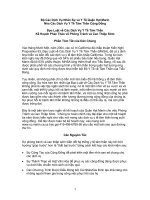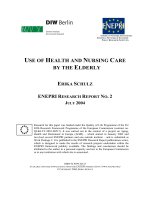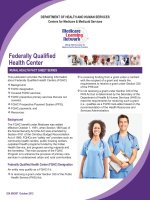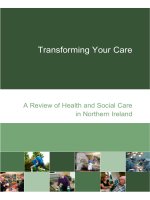DEPARTMENT OF HEALTH AND HUMAN SERVICES: Centers for Medicare & Medicaid Services potx
Bạn đang xem bản rút gọn của tài liệu. Xem và tải ngay bản đầy đủ của tài liệu tại đây (1.05 MB, 6 trang )
DEPARTMENT OF HEALTH AND HUMAN SERVICES
Centers for Medicare & Medicaid Services
Official CMS Information for
Medicare Fee-For-Service Providers
R
Federally Qualied
Health Center
RURAL HEALTH FACT SHEET SERIES
This publication provides the following information
about Federally Qualied Health Centers (FQHC):
Background;
FQHC designation;
Covered FQHC services;
FQHC preventive primary services that are not
covered;
FQHC Prospective Payment System (PPS);
FQHC payments; and
Resources.
Background
The FQHC benet under Medicare was added
effective October 1, 1991, when Section 1861(aa) of
the Social Security Act (the Act) was amended by
Section 4161 of the Omnibus Budget Reconciliation
Act of 1990. FQHCs are “safety net” providers such as
community health centers, public housing centers,
outpatient health programs funded by the Indian
Health Service, and programs serving migrants and
the homeless. The main purpose of the FQHC
Program is to enhance the provision of primary care
services in underserved urban and rural communities.
Federally Qualied Health Center (FQHC) Designation
An entity may qualify as a FQHC if it:
Is receiving a grant under Section 330 of the Public
Health Service (PHS) Act;
Is receiving funding from a grant under a contract
with the recipient of a grant and meets the
requirements to receive a grant under Section 330
of the PHS Act;
Is not receiving a grant under Section 330 of the
PHS Act but is determined by the Secretary of the
Department of Health & Human Services (HHS) to
meet the requirements for receiving such a grant
(i.e., qualies as a FQHC look-alike) based on the
recommendation of the Health Resources and
Services Administration;
ICN 006397 October 2012
Was treated by the Secretary of the Department of
HHS for purposes of Medicare Part B as a
comprehensive Federally funded health center as
of January 1, 1990; or
Is operating as an outpatient health program or
facility of a tribe or tribal organization under the
Indian Self-Determination Act or as an urban Indian
organization receiving funds under Title V of the
Indian Health Care Improvement Act as of
October 1, 1991.
Covered Federally Qualied Health Center (FQHC)
Services
Payments are made directly to the FQHC for covered
services furnished to Medicare patients. Services are
covered when furnished to a patient at the FQHC, the
patient’s place of residence, or elsewhere (e.g., at the
scene of an accident). A FQHC generally furnishes the
following services:
Physician services;
Services and supplies incident to the services of
physicians;
Nurse practitioner (NP), physician assistant (PA),
certied nurse-midwife (CNM), clinical psychologist
(CP), and clinical social worker (CSW) services;
Services and supplies incident to the services of
NPs, PAs, CNMs, CPs, and CSWs;
Visiting nurse services to the homebound in an
area where the Centers for Medicare & Medicaid
Services (CMS) has determined that there is a
shortage of Home Health Agencies;
Otherwise covered drugs that are furnished by, and
incident to, services of a FQHC provider; and
Outpatient diabetes self-management training and
medical nutrition therapy for patients with diabetes
or renal disease.
FQHCs also furnish preventive primary health services
when furnished by or under the direct supervision of a
physician, NP, PA, CNM, CP, or CSW. The following
preventive primary health services are covered when
furnished by FQHCs to a Medicare patient:
Medical social services;
Nutritional assessment and referral;
Preventive health education;
Children’s eye and ear examinations;
Well child care, including periodic screening;
Immunizations, including tetanus-diphtheria booster
and inuenza vaccine;
Voluntary family planning services;
Taking patient history;
Blood pressure measurement;
Weight measurement;
Physical examination targeted to risk;
Visual acuity screening;
Hearing screening;
Cholesterol screening;
Stool testing for occult blood;
Tuberculosis testing for high risk patients;
Dipstick urinalysis; and
Risk assessment and initial counseling regarding
risks.
For women only:
Prenatal and post-partum care;
Prenatal services;
Clinical breast examination;
Referral for mammography; and
Thyroid function test.
2
Federally Qualified Health Center
Federally Qualied Health Center (FQHC) Preventive
Primary Services That Are Not Covered
FQHC preventive primary services that are not
covered include:
Group or mass information programs, health
education classes, or group education activities,
including media productions and publications; and
Eyeglasses, hearing aids, and preventive dental
services.
Items or services that are covered under Part B, but
are not FQHC services, include:
Certain laboratory services;
Durable medical equipment (whether rented or sold),
including crutches, hospital beds, and wheelchairs
used in the patient’s place of residence;
Ambulance services;
The technical component of diagnostic tests such
as x-rays and electrocardiograms;
The technical component of the following preventive
services:
•
Screening pap smears;
•
Prostate cancer screening;
•
Colorectal cancer screening tests;
•
Screening mammography; and
•
Bone mass measurements;
Prosthetic devices that replace all or part of an
internal body organ, including colostomy bags,
supplies directly related to colostomy care, and the
replacement of such devices; and
Leg, arm, back, and neck braces and articial legs,
arms, and eyes, including replacements (if required
because of a change in the patient’s physical
condition).
Federally Qualied Health Center Prospective
Payment System (FQHC PPS)
The FQHC PPS is scheduled for implementation in
2014 and as mandated by the Affordable Care Act of
2010, CMS must collect and analyze the data required
to develop and implement the new payment system.
Therefore, beginning with dates of service on or after
January 1, 2011, all services provided should be listed
with the appropriate revenue code and Healthcare
Common Procedure Coding System (HCPCS) code
for each line. For more information about the data that
must be submitted for the FQHC PPS, please refer to
MLN Matters® Article SE1039 located at http://www.
cms.gov/Outreach-and-Education/Medicare-Learning-
Network-MLN/MLNMattersArticles/Downloads/
SE1039.pdf on the CMS website.
Federally Qualied Health Center (FQHC) Payments
Generally, Medicare pays FQHCs (which are considered
suppliers of Medicare services) an all-inclusive per
visit payment amount based on reasonable costs as
reported on its annual cost report. The patient pays no
Part B deductible for FQHC services but is responsible
for paying the coinsurance, with the exception of:
FQHC-supplied inuenza and pneumococcal
vaccines, which are paid at 100 percent;
FQHC-supplied Hepatitis B vaccine (HBV), which is
paid at 100 percent;
Personalized prevention plan services (effective
January 1, 2011); and
Any covered preventive service that is recommended
with a grade of A or B by the U.S. Preventive
Services Task Force (effective January 1, 2011).
3
Federally Qualified Health Center
The coinsurance for FQHC services is 20 percent of
the clinic’s reasonable and customary billed charges
except for mental health treatment services, which are
subject to the 62.5 percent outpatient mental health
treatment limitation. The application of the outpatient
mental health treatment limitation increases the patient’s
copayment to 50 percent of the clinic’s reasonable and
customary billed charges. This limit does not apply to
diagnostic services. With enactment of the Medicare
Improvements for Patients and Providers Act of 2008,
the amount of this limitation will be reduced
incrementally over the next ve years beginning with
services provided on or after January 1, 2010.
The FQHC all-inclusive visit rate is calculated, in
general, by dividing the FQHC’s total allowable cost
by the total number of visits for all FQHC patients. The
FQHC payment methodology includes two national
per-visit upper payment limits – one for urban FQHCs
and one for rural FQHCs. The two national FQHC
per-visit upper payment limits are increased annually
by the Medicare Economic Index applicable to primary
care physician services. A FQHC is designated as an
urban or rural entity based on denitions in Section
1886(d)(2)(D) of the Act. If a FQHC is not located
within a Metropolitan Statistical Area (now generally
known as a Core Based Statistical Area) or New
England County Metropolitan Area, it is considered
rural and the rural limit applies. Rural FQHCs cannot
be reclassied into an urban area for FQHC payment
limit purposes.
Freestanding FQHCs must complete Form CMS-222-92,
Independent Rural Health Clinic and Freestanding
Federally Qualied Health Center Cost Report, to
identify all incurred costs applicable to furnishing
covered FQHC services. Please refer to the “Provider
Reimbursement Manual – Part 2” (Publication 15-2),
Chapter 29, located at />and-Guidance/Guidance/Manuals/Paper-Based-
Manuals-Items/CMS021935.html on the CMS website,
to nd Form CMS-222-92.
Provider-based FQHCs must complete the appropriate
worksheet designated for FQHC services within the
parent provider’s cost report. For example, FQHCs
based in a hospital complete Worksheet M of Form
CMS-2552-96, Hospital and Hospital Complex Cost
Report. At the beginning of the FQHC’s scal year, the
Medicare Claims Administration Contractor calculates
an interim all-inclusive visit rate based on either
estimated allowable costs and visits from the FQHC
(if it is new to the FQHC Program) or on actual costs
and visits from the previous cost reporting period
(for existing FQHCs). The FQHC’s interim all-inclusive
visit rate is reconciled to actual reasonable costs at
the end of the cost reporting period. Please refer to the
“Provider Reimbursement Manual – Part 2”
(Publication 15-2), Chapter 36, located at http://www.
cms.gov/Regulations-and-Guidance/Guidance/Manuals/
Paper-Based-Manuals-Items/CMS021935.html on the
CMS website, to nd Form CMS-2552-96.
Inuenza and Pneumococcal Vaccine
Administration and Payment
The cost of the inuenza and pneumococcal vaccines
and related administration are separately reimbursed
at annual cost settlement. There is a separate
worksheet on the cost report to report the cost of
these vaccines and related administration. The patient
pays no Part B deductible or coinsurance for these
services. When a FQHC practitioner (e.g., a physician,
NP, PA, or CNM) sees a patient for the sole purpose of
administering these vaccinations, the FQHC may not
bill for a visit; however, the costs of the vaccine and its
administration are included on the annual cost report and
reimbursed at cost settlement. As of January 1, 2011,
FQHCs must report separate revenue lines for the
inuenza and pneumococcal vaccines when reporting
a billable visit/encounter for data collection and
analysis of the PPS.
Hepatitis B Vaccine (HBV) Administration and
Payment
The cost of the HBV and related administration are
covered under the FQHC’s all-inclusive rate. If other
services that constitute a qualifying FQHC visit are
furnished at the same time as the HBV, the charges
for the vaccine and related administration should be
reported on a separate line item to ensure that
deductible and coinsurance are not applied. When a
FQHC practitioner (e.g., a physician, NP, PA, or CNM)
sees a patient for the sole purpose of administering
this vaccination, the FQHC may not bill for a visit;
however, the costs of the vaccine and its
administration are included on the annual cost report.
Charges for the HBV may be included on a claim for the
patient’s subsequent FQHC visit. As of January 1, 2011,
FQHCs must report separate revenue lines for the
HBV when reporting a billable visit/encounter for data
collection and analysis of the PPS.
Skilled Nursing Facility Prospective Payment
System (SNF PPS) Exclusion
Professional services furnished by physicians, NPs,
PAs, and CPs who are afliated with FQHCs are
excluded from the Skilled Nursing Facility PPS, in the
same manner as such services would be excluded if
furnished by individuals who are not afliated with
FQHCs.
4
Federally Qualified Health Center
Resources
The chart below provides FQHC resource information.
ForMoreInformationAbout… Resource
Federally Qualied Health Centers
/>Qualied-Health-Centers-FQHC-Center.html on the
CMS website
Chapter 13 of the “Medicare Benet Policy Manual”
(Publication 100-02) located at />Regulations-and-Guidance/Guidance/Manuals/
Downloads/bp102c13.pdf on the CMS website
Chapter 9 of the “Medicare Claims Processing Manual”
(Publication 100-04) located at />Regulations-and-Guidance/Guidance/Manuals/
Downloads/clm104c09.pdf on the CMS website
Compilation of Social Security Laws
/>on the U.S. Social Security Administration website
All Available Medicare Learning Network® (MLN)
Products
“Medicare Learning Network® Catalog
of Products” located at .
gov/Outreach-and-Education/Medicare-
Learning-Network-MLN/MLNProducts/
Downloads/MLNCatalog.pdf on the
CMS website or scan the Quick
Response (QR) code on the right
Provider-Specic Medicare Information
MLN publication titled “MLN Guided Pathways to
Medicare Resources Provider Specic Curriculum for
Health Care Professionals, Suppliers, and Providers”
booklet located at />Education/Medicare-Learning-Network-MLN/MLNEd
WebGuide/Downloads/Guided_Pathways_Provider_
Specic_Booklet.pdf on the CMS website
Medicare Information for Beneciaries
on the CMS website
5
Federally Qualified Health Center
Helpful Websites
AmericanHospitalAssociationRuralHealthCare
/>CriticalAccessHospitalsCenter
/>Hospitals-Center.html
DisproportionateShareHospital
/>Payment/AcuteInpatientPPS/dsh.html
FederallyQualiedHealthCentersCenter
/>Qualied-Health-Centers-FQHC-Center.html
HealthResourcesandServicesAdministration
HospitalCenter
/>Center.html
MedicareLearningNetwork®
/>NationalAssociationofCommunityHealthCenters
NationalAssociationofRuralHealthClinics
NationalRuralHealthAssociation
PhysicianBonuses
/>Payment/HPSAPSAPhysicianBonuses
RuralAssistanceCenter
RuralHealthClinicsCenter
/>Clinics-Center.html
SwingBedProviders
/>Payment/SNFPPS/SwingBed.html
Telehealth
/>Information/Telehealth
U.S.CensusBureau
Regional Ofce Rural Health Coordinators
Below is a list of contact information for CMS Regional
Ofce Rural Health Coordinators who provide technical,
policy, and operational assistance on rural health issues.
RegionI–Boston
RickHoover
E-mail:
Telephone: (617) 565-1258
States: Connecticut, Maine,
Massachusetts, New Hampshire,
Rhode Island, and Vermont
RegionII–NewYork
MiechalLefkowitz
E-mail:
Telephone: (212) 616-2517
States: New Jersey, New York,
Puerto Rico, and Virgin Islands
RegionIII–Philadelphia
PatrickHamilton
E-mail:
Telephone: (215) 861-4097
States: Delaware, Maryland,
Pennsylvania, Virginia, West
Virginia, and the District of Columbia
RegionIV–Atlanta
LanaDennis
E-mail:
Telephone: (404) 562-7379
States: Alabama, Florida, Georgia,
Kentucky, Mississippi, North
Carolina, South Carolina,
and Tennessee
RegionV–Chicago
ChristineDavidson
E-mail:
Telephone: (312) 886-3642
States: Illinois, Indiana, Michigan,
Minnesota, Ohio, and Wisconsin
RegionVI–Dallas
KaleighEmerson
E-mail:
Telephone: (214) 767-6444
States: Arkansas, Louisiana, New
Mexico, Oklahoma, and Texas
RegionVII–KansasCity
ClaudiaOdgers
E-mail:
Telephone: (816) 426-6524
States: Iowa, Kansas, Missouri,
and Nebraska
RegionVIII–Denver
LylaNichols
E-mail:
Telephone: (303) 844-6218
States: Colorado, Montana, North
Dakota, South Dakota, Utah,
and Wyoming
RegionIX–SanFrancisco
NealLogue
E-mail:
Telephone: (415) 744-3551
States: Arizona, California, Hawaii,
Nevada, Guam, Commonwealth
of the Northern Mariana Islands,
American Samoa, Marshall Islands,
Republic of Palau, and Federated
States of Micronesia
RegionX–Seattle
TeresaCumpton
E-mail:
Telephone: (206) 615-2391
States: Alaska, Idaho, Oregon,
and Washington
Official CMS Information for
Medicare Fee-For-Service Providers
R
This fact sheet was current at the time it was published or uploaded onto the web. Medicare policy changes frequently so links to the source documents have been provided
within the document for your reference.
This fact sheet was prepared as a service to the public and is not intended to grant rights or impose obligations. This fact sheet may contain references or links to statutes,
regulations, or other policy materials. The information provided is only intended to be a general summary. It is not intended to take the place of either the written law or
regulations. We encourage readers to review the specic statutes, regulations, and other interpretive materials for a full and accurate statement of their contents.
Your feedback is important to us and we use your suggestions to help us improve our educational products, services and activities and to develop products, services and
activities that better meet your educational needs. To evaluate Medicare Learning Network® (MLN) products, services and activities you have participated in, received, or
downloaded, please go to and click on the link called ‘MLN Opinion Page’ in the left-hand menu and follow the instructions.
Please send your suggestions related to MLN product topics or formats to
The Medicare Learning Network® (MLN), a registered trademark of CMS, is the brand name for ofcial CMS educational products and information for Medicare Fee-For-Service
Providers. For additional information, visit the MLN’s web page at on the CMS website.
6
Federally Qualified Health Center









